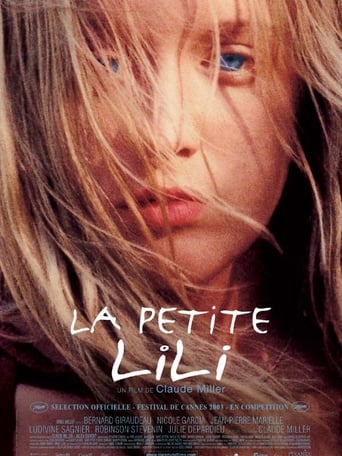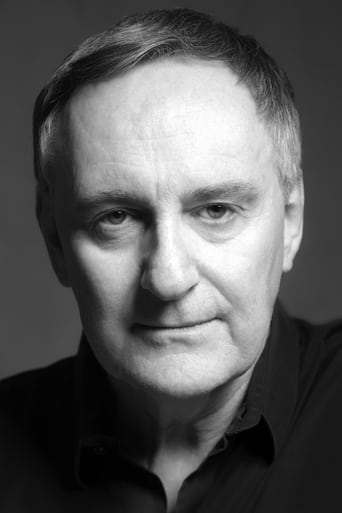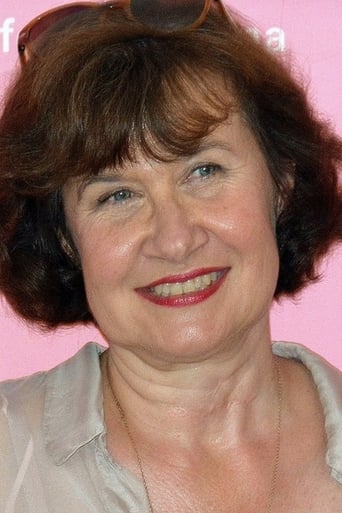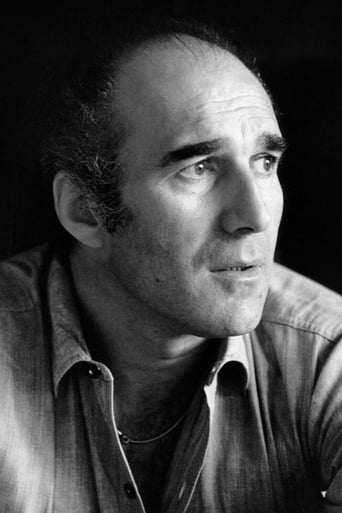This film, loosely inspired by Anton Chekov's The Seagull, weaves a story about sex, family and the business of making films. When the young and overly sensitive filmmaker Julien screens his new DV art-film starring his girlfriend Lili (Swimming Pool's Ludivine Sagnier) --a sexy young local girl--to his famous actress mother Mado, and her lover Brice, an accomplished film director, an unraveling of the delicate peace in their house begins. The graceful beauty Lili, who dreams of becoming a famous actress like Mado, is immediately fascinated by Brice, who gladly falls prey to her charms.
Reviews
Overrated and overhyped
I don't have all the words right now but this film is a work of art.
Admirable film.
what a terribly boring film. I'm sorry but this is absolutely not deserving of best picture and will be forgotten quickly. Entertaining and engaging cinema? No. Nothing performances with flat faces and mistaking silence for subtlety.
'La petite Lili' (= French for 'the small Lili') is constructed after a theater-play by the great Russian Anton Chekov. This film moves on slowly, yes, focusing much more on dialogs than on visuals. Allowing its public plenty of time to keep track.Its setting connects only to well: a film-crowd at leisure, on holidays in the French countryside. In this respect there must be praise for the visuals of a film-part that never gets any praise: the introduction, cleverly putting you in the right holiday-mood.Right thereafter comes the shock: female lead Ludivine Sagnier is shown blatantly naked. This makes a very strong visual, but not one that fits well in this film's overall setting. However, as 'La petite Lili' has just started, maybe its viewers are not yet aware of its overall setting. Whatever director Claude Miller had in mind, in hindsight one must conclude that his naked Ludivine is too much.Having survived this out-of-tune whirlwind-start, you can sit down to watch comfortably. 'La petite Lili' provides a well-balanced story, acted out by some very good actors. Just enjoy.
No character isn't tinged with cliché. Maybe we don't like them, maybe we do like this one or that, but so what? Even the film within a film within, ultimately, a film-in-the-making is clichéd. Or maybe such Chinese boxes have become their own genre. But if you're lucky enough to own the disk, or to hang onto a rental long enough, watch it once just for the edits, the cuts. Early on, in and around the country house, they're so frequent and abrupt they should be dizzying, but they aren't. They're always natural, true either psychologically or mechanically. The camera skips indoors and out almost, though maybe not quite, to the point where you could sketch the layout. An uncertain eye becomes a firm hand. The target of a gaze suddenly becomes the new point of view. Or someone walks into the inanimate focus of a gaze, so cut to somewhere unexpected, this new person's gaze. Point of view shifts so often, so seamlessly, it seems almost to justify me in an argument I not sure I didn't lose once about the viability of film against prose in conveying emotional detail. How difficult is it to shift point of view half a dozen times on a page or even six without degrading the game? When the whole structure threatens to replay itself toward the finish, it doesn't quite because Julien's chosen a perhaps not very French but not so unlike recent Rohmer sound-stage version of the country house. The cuts still dance, but it's a broken, postmodern dance. The actors, all I think but Julien who's out to direct and Simon, who stumbles about hilariously humbled by the shadow of too calm, too mirror-image Michel Piccoli playing him, move like too-smooth marionettes.In the end, the film is about the contrast between the opening mise en scène and the closing. It's a glorious suspense film, with no resolution to the question it asks. Can Julien pull it off? I can't recall a more completely realized Miller film.
"La Petite Lili" is a delightful, visually enticing reinterpretation of Chekhov's "The Seagull" through a very Gallic sensibility, similar to how "Clueless" updated and Americanized Austen's "Emma."While retaining most of the original dialogue and plot as a droll commentary on the more things change the more they stay the same, co-writer/director Claude Miller cleverly updates the artistic medium of debate from literature to film and uses his visual powers to very sensually illustrate the sub-text that in most productions is stifled under 19th century Russian costumes. Because for all the high falultin' talk of aesthetics and generational conflict, and intellectual art vs. commercial pandering, lust is the primary motivator. Essentially, all the men are led around by their genitals and the women are empowered by controlling them (and it was suspenseful as to which of the competing women would succeed at it for the long run as to whether any of the men could remain faithful to them). For all their intellectual pretensions, all the characters are ruled by their emotions. Miller wonderfully sets us up for the hot indolence of a country home weekend with a nude nubile Ludivine Sagnier, triggering a much more more effective mise en scene than Bernardo Bertolucci did in "Stealing Beauty." The effect Sagnier has on all the gathered extended family members is palpable and her brazen manipulations are consistent through to the ironic conclusion. I thought through most of the movie that the director was possibly unaware of just how equally visually mesmerizing her counterpart Robinson Stévenin is on screen, as only one character responds to him, until I saw that James Dean is thanked in the acknowledgments and realized that Miller was using this brooding hunk as an archetype as well (his one final smile is almost a shock). The last act is a culminating commentary on Chekhov's jarring denouement, claiming that "this is how it should have turned out." Miller softens some of the punishing sexism of the original while putting together a film-within-a-film like Hamlet's play-within-a-play that revenges on the ex-girlfriend, the mother, the mother's lover, etc. full of both comedy and tension. The sub-titles are many times white on white for difficult reading.
I'm still trying to figure out what it is about the French and Classic texts. They love 'fixing' them when they ain't broke as much as they seem to love the originals. In the last five years I've seen on the Paris stage productions of 'Un Tramway nomme Desir' in which the 'flowers for the dead' reference was moved from the beginning to the end; where Blanche and Mitch not only went on a date but were SHOWN in a jazz club complete with a full-length blues performed by a Black singer (not in any production I've ever seen) and, to cap it all, the nurse who accompanies the doctor in the final scene was played by an obvious transvestite wearing drag ('she' was listed as a man in the program) who arm-wrestles Blanche to the floor. This was followed a couple of years later by 'The Glass Menagerie' which begins with a Prologue in which Tom and The Gentleman Caller perform a soft-shoe to Jack Teagarden's recording of 'I'm Confessing'. In the original play the Gentleman Caller appears only at the end but what does Tennessee Williams know. Chekhov gets the same treatment. La Petite Lili is a take on 'The Seagull' and last year I fought to get tickets for an acclaimed production starring a great French actress, Irene Jacob, as Nina. I was slightly bemused BEFORE the play started when the management appeared to play EVERY recording of 'Over The Rainbow' in existence. Then the play began - with Masha performing a raunchy version of 'I Can't Get No Satisfaction' punctuated by swigs from a can of lager (neither the song nor canned beer was available in 19904). Call me square and old fashioned but I prefer the opening line that Chekhov wrote for Masha 'I'm in mourning for my life'. As if that weren't enough from time to time the proceedings ground to a halt as the ensemble broke into 'Somewhere Over The Rainbow'. But why am I telling you all this? Because now Claude Miller has put his two cents worth in, updating the story to take account of film and video technology and changing the character's names although leaving their actual roles the same. There's some nice moody photography but when the oldest character on the Lot, the superb Jean Paul Marielle, runs, not walks away with the movie something is badly wrong. All things being equal this should be Nina's movie but given that they cast the ubiquitous Ludivine Sagnier (again at the expense of the far superior Virginie Ledoyan) who is rapidly cornering the market in overripe sexy sluts (think Jennifer Jones in 'Gone to Earth', 'Duel In The Sun', etc), and clearly has her eyes on the gap left by Vanessa Paradis, this was never going to happen. If only someone would get hip that's it's not enough to look as though you go through life wearing slightly soiled underwear and are happy to flaunt your dubious charms and play sex scenes, you also have to be able to ACT, then maybe Sagnier could settle for a career in the French equivalent of the 'Carry On' series and leave the acting to Ledoyan. On the plus side this film is worth seeing if only for a handful of scenes at the end in which Marielle comes face to face on a movie set with Michel Piccoli, playing Marielle on film (don't ask). It seems that when Claude Miller is killing waterfowls he leaves no tern unstoned.
Top Streaming Movies























